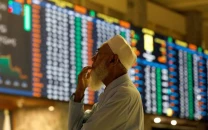For new government, rethinking governance is a must
New managers need to establish a solid presence in popular imagination.

It is important that the government start an aggressive programme of public perception management. PHOTO: FILE
The proposed budget does not boost the demand side as such, and it appears as if the government wants to pursue a policy of austerity not only by reducing government expenditures, but also by not injecting more cash to increase the disposable income of households.

The budget reflects the thinking of supply side economists, who believe that growth should be led by incentivising the production sector. This is in line with the supply side policies of Sartaj Aziz when he served as finance minister under the first Nawaz Sharif regime. At that time, supply side economics could not fully succeed in bringing the economy out of stagflation, but it appears as if the policy may be more successful this time around.
The Ministry of Finance has adopted a very balanced approach to spurring economic activity; increasing incentives in the sectors and segments where economic activity is more elastic to fiscal measures, and reducing incentives in areas deemed to be either less productive or less elastic to fiscal changes.
While there is no doubt that these measures are bound to bear results in due time, it is important that the government start an aggressive programme of public perception management.
In other emerging markets, like Malaysia, the government has attempted to manage public perception by pursuing a policy of engagement with the masses through international and national conferences, provincial symposia and city level seminars and corner meetings. The new government in Pakistan cannot afford to ignore social media where opposition parties, especially the Pakistan Tehrik e Insaf (PTI) and other pressure groups like Dr Tahirul Qadiri’s Pakistan Awami Tehrik (PAT) dominate. If the government fails to reach out to users of social media, it will not be too distant in the future that such political parties and pressure groups succeed in creating havoc similar to what is being witnessed in Taksim Square in Istanbul. If such a disturbance crops up, the government will find itself caught in a web of political problems that will make it extremely difficult for it to pursue its economic policies of growth and economic revival.

The proposed budget is certainly business-friendly, and it is only fair for the government to seek help from the business community to manage public perception. The role of electronic media will also be important in ensuring that the general public shows trust and confidence in the economic policies of the new government. While action against one police officer who advertised in a newspaper congratulating the new government is in itself appreciable, the government must ensure that both the print and the electronic media remain on its side. This will obviously mean giving advertisement business to the media. While certainly a non-developmental expense, the government will have to accept spending on many of this kind of undesired activities; otherwise it will be very easy for the free media to twist public perception against economic policies that are seemingly more business-friendly than favouring the general public, at least in the short run.
It might sound superficial, but it is extremely important for the government to sponsor a series of international conferences to be held in major cities like Karachi, Lahore and Islamabad. Such international conferences, which attract foreign delegates, create a feel good environment which is not only helpful for the business sector, but also generates a favourable vibe amongst the masses.
An area of focus could be Islamic banking and finance. In fact, it may not be a bad idea at all if the government sponsors an international sukuk summit in Lahore. This sukuk summit should attempt to bring investors from around the world, who should be exposed to various sukuk-friendly investment opportunities in Pakistan.
Lastly, the tradition of industrial exhibitions should be revived, allowing all industrial cities in the country to hold industrial exhibitions and showcase regional products and innovations to the visiting general public.
Such activities, whatsoever superficiality they may exhibit, are certainly helpful in creating confidence in the general public and a feel-good factor that is absolutely essential for the new government in buying some time from the people, who are otherwise looking for a miracle to take away the miseries they have lived with for the last five years.
The writer is an economist and a PhD from Cambridge University.
Published in The Express Tribune, June 24th, 2013.
Like Business on Facebook, follow @TribuneBiz on Twitter to stay informed and join in the conversation.



















COMMENTS
Comments are moderated and generally will be posted if they are on-topic and not abusive.
For more information, please see our Comments FAQ